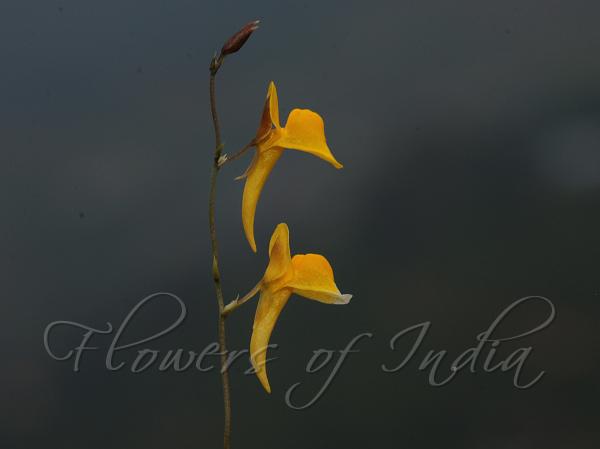|
| Climbing Bladderwort |
|

|

| File size | 299368 |
| Original date | 12/27/18 1:49 AM |
| Resolution | 5472 x 3648 |
| Flash | Flash fired |
| Focal length | 60.0mm |
| Exposure time | 1/250s |
| Aperture | 14.0 |
| Focus Distance | |
| Metering Mode | Center weighted average |
| Camera make | Canon |
| Camera model | Canon EOS 70D |
| Sensor type |
|
|
|
|
Photo: |
Botanical name: Utricularia scandens Family: Lentibulariaceae (Bladderwort family)
Synonyms: Utricularia capillacea, Utricularia wallichii, Utricularia volubilis
Synonyms: Utricularia capillacea, Utricularia wallichii, Utricularia volubilis
Climbing Bladderwort is a herb with rhizoids up to 1.5
cm long, branches up to 1 mm, papillose; runners up to 3 cm long,
thread-like, profusely branched. Flower-racemes are up to 25 cm long,
twining, rarely erect in smaller ones, hairless, 1-9-flowered with
sterile bracts present in between fertile ones; bracts 1-1.5 mm long,
broadly ovate, tapering; bracteoles 0.3-1.4 mm long, linear to
lanceshaped. Flowers are 5-12 mm long; flower-stalks 1-5 mm long,
erect, winged. Sepals are 2-3 x 1.1-3 mm ovate; upper sepal pointed to
tapering at tip; lower one bi- or tritoothed at tip. Flowers are
yellow; upper lip 2-3 mm long, obovate to oblong, constricted near
middle, a crest running across at middle, blunt to notched at tip;
lower lip 3-6.5 x 2.5- 3 mm, more or less obovate, hairy in throat,
gibbous at base, rounded or shallowly notched at tip; spur 2-6 mm long,
subulate or rarely conical, pointed and curved at tip. Stamens are
about 1 mm long. Foliar organs are up to 15 x 1 mm, linear, 1-nerved,
pointed or rounded at tip. Traps are about 1 mm across, more or less
spherical; stalk glandular, often columnar growth present near base;
mouth basal; appendages 2, simple, subulate. Climbing Bladderwort is
found in Tropical & S. Africa, Madagascar, Indian Subcontinent to China
and Peninsula Malaysia, New Guinea. Flowering: All year.
| Identification credit: C. Rajasekar | Photographed in Kollimalai-Namakkal, Tamil Nadu. |
• Is this flower misidentified? If yes,